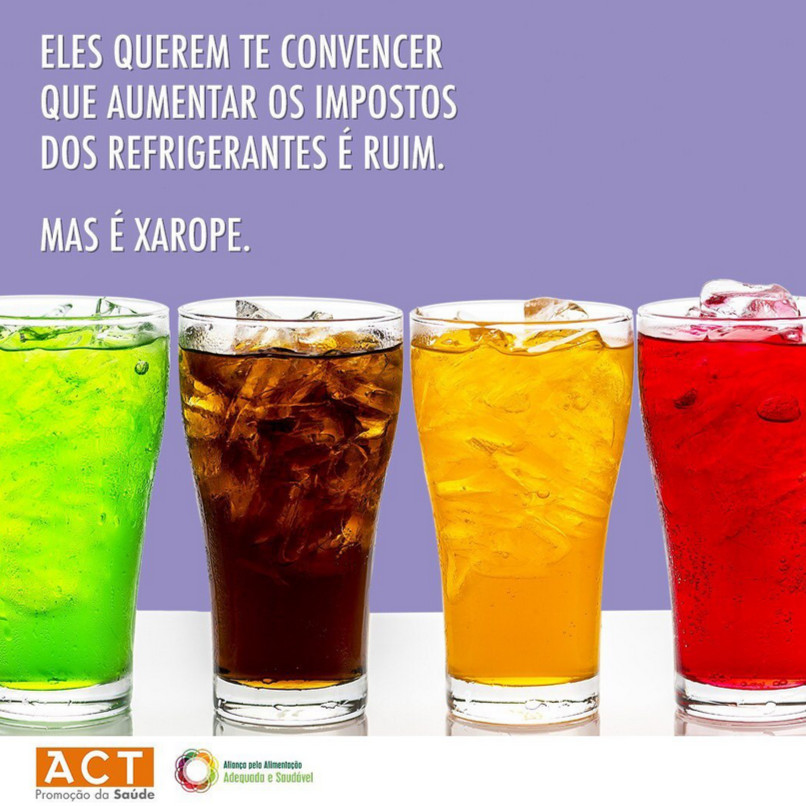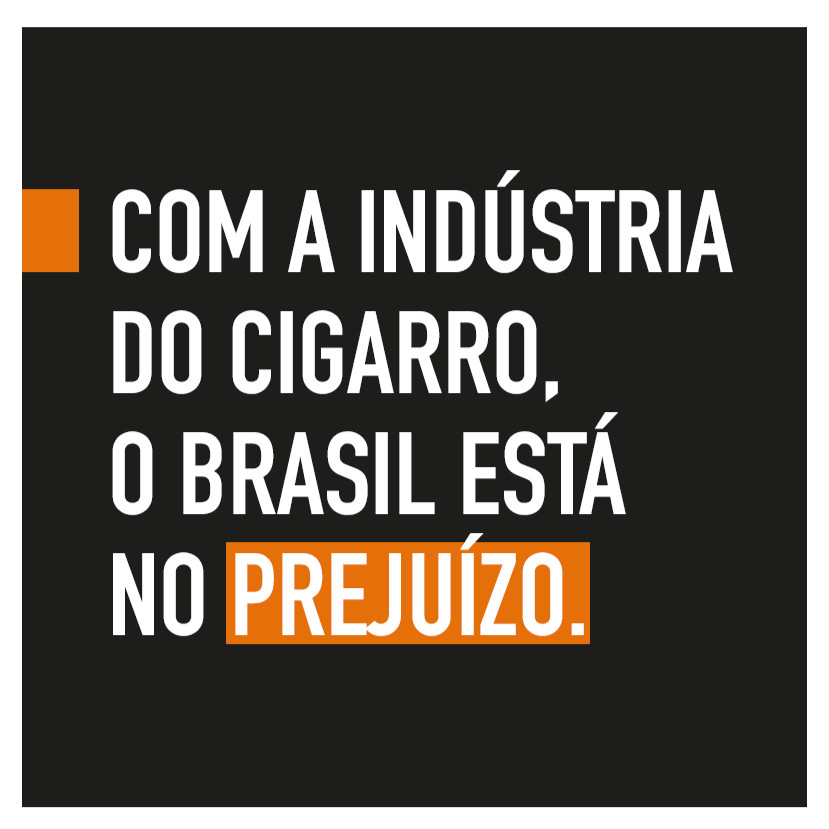ACT Monitor bulletin - 13th edition
19.04.22MARCH - April - May 2022
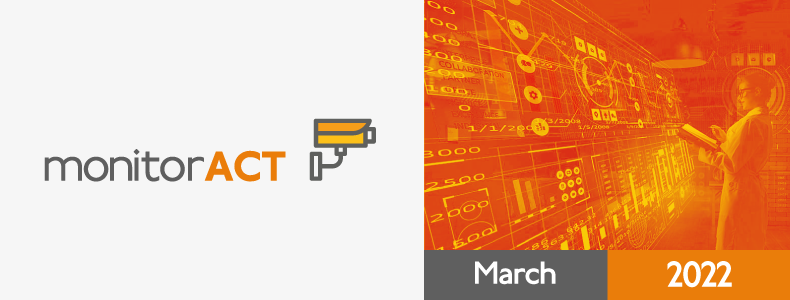
Editorial
Have you ever heard of the term Talking Trash? It’s an expression that means someone is saying something from which not much can be extracted, such as the speech of some politicians, long interviews given by football players after a game or the conversation of many of the celebrities in the spotlight. In essence, it is a new expression for an old well-known word in Portuguese: our very own “embromação”; in other words, the art of beating around the bush or talking crap.
This is the kind of nonsense that plastic-producing companies have been talking, in an attempt to clean up their image, which is already starting to become a bit blurred. After all, the amount of plastic dumped on the planet is so absurd that it could cover the entire surface of the Earth, going from the bottom of the sea to the highest mountain. Plastic micro-particles can be found in the marine and terrestrial faunas, in soils, oceans and even in placentas. As we have been made aware in some cases involving the tobacco industry, we start to see voluntary agreement options starting to appear, in order to halt plastic pollution. They are, however, agreements which are incapable of facing the crisis generated by their products, so inefficient in fact that the United Nations are suggesting a global treaty for this challenge in a short space of time. This is the theme which the opening article in MonitorACT, “Talking Trash: Are Companies interested in ending Plastic Pollution?” will discuss.
This edition has something unique about it. It brings up more doubt than certainty, perhaps a reflection of the times we are living in. For that reason, in “What Has Happened to Social Participation? Dismounting Collegiate Bodies and the Threat to Democracy”, the authors ask questions about this right which is guaranteed by Constitution. As they expose the dismantling of counsels, they provide concrete examples on the consequences of the dismounting of health and food security and the fragility of the moment that Brazilian society is going through.
“The Daily Poison on our Plate” exposes the consequence of moving popular participation away from the approval of a draft bill which puts health and the environment at risk: the Poison Package. Although it had been moving through legislation for 20 years, it was put up to vote at the end of last year, and under protest, strategically removed from the agenda only to sneak back at the beginning of the legislative year. With the support of the rural caucus and agribusiness, it was eventually approved. It not only relaxes the rules for forbidden agro-chemicals but also gives these products a new name: pesticides. In the long run, these products increase food insecurity and contribute to the so-called rural exodus, for they destroy arable land. In a country filled with large cities affected by social inequality, abject poverty and violence, would these urban centers have the capacity to absorb these new inhabitants with dignity? That is yet another question provoked by this edition.
The last article, “8M: The Advances Made by the Alcohol and Tobacco Industries During Women’s Month”, goes back to a recurring theme when it comes to assessing interference by the industry, the capturing of the feminist movement by companies that make products that are harmful to health. Since gender equality has become a global cause, we see that cigarette and alcoholic beverage manufacturers, for example, have understood the importance of girls and women to their products and are investing heavily into researching new products and new forms of communication towards this audience. To the authors, women’s month brings up this very evident issue and shows that public policies to combat risk factors also need to adopt gender perspective.
Enjoy your reading!
Anna Monteiro
Talking Trash: Are Companies Interested in Ending Plastic Pollution?
By Vitória Moraes, Marília Albiero and Emily Almeida
Pollution caused by increased plastic production is one of the biggest challenges in the field of environmental sustainability. In addition to actual pollution, plastic refineries are among the biggest greenhouse gas emitters on the planet, ascribing to them a certain amount of antagonism with regard to fighting climate change. Numbers show that production more than doubled in a 20-year period, and it is estimated that it should reach the 1.8 billion ton mark by 2050 (PNUMA/ONU and Grida-Arendal, 2013).

The Food and Agriculture Organization of the United Nations draws attention to the contamination of the same land where our food is grown, as well as reporting the presence of plastic micro-particles in human feces and even in the placentas of pregnant women.

Although not much is known about the effects of plastic on human health, results from studies on animals have shown that this material releases potentially toxic substances which act as hormone deregulators, and can even penetrate the barrier that prevents toxins from accessing the central nervous system, which draws attention to the development of possible brain damage. Plastic life cycle stages present extremely harmful health risks, contributing to the onset of certain types of cancer, reproductive problems and genetic disorders on a global scale.
The United Nations Environment Program announced an agreement which predicts the end of pollution by plastic by 2024. Inger Andersen, the Project’s executive manager, states that this is the most relevant result achieved by UNEA since the Paris Agreement in 2015. The initiative establishes the creation of an Intergovernmental Negotiation Committee, scheduled to begin this year, aiming to conclude a final global agreement proposal by 2024.
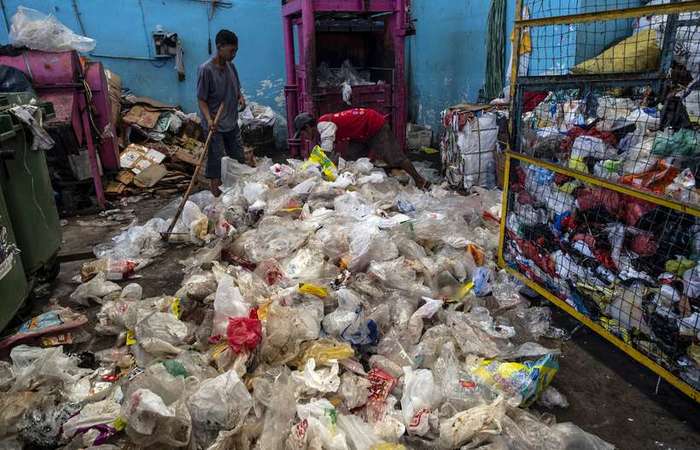
In the weeks preceding the meeting, over 70 companies signed a manifest, created two years ago, to reduce pollution caused by plastic. Corporations from the food sector such as Coca-Cola, Nestlé, Danone, Pepsico and Mondelez, among the planet’s 10 largest plastic polluters, participated in the manifest, which was considered by the WWF and the Ellen MacArthur Foundation as a pioneering movement, in the sense that it originates from representatives of the corporate world, defending the creation of a robust plastic reduction policy.

In a recent interview to the World Economic Forum portal, Nestlé executive vice-president Leanne Geale stated that the world has already wasted too much time debating a possible plastic regulation and warns about the efficacy of a strategy coordinated at the global level in detriment of attempts at regulation in individual countries.
But that is where the data comes onto the scene: the data in question is from the 2020 report called “ ‘Talking Trash’ or ‘Talking plastic – the corporate fake solution guide to the plastic crisis”, which points out that most of the voluntary initiatives proposed by the corporate sector as a solution to face the plastic crisis were inefficient. Just as we had seen in other voluntary agreements in the tobacco and food sectors.

The document, prepared by the Changing Markets foundation, analyzes voluntary commitments taken on by the ten companies who are mainly responsible for plastic pollution (Coca-Cola, Colgate-Palmolive, Danone, Mars Incorporated, Mondelēz International, Nestlé, PepsiCo, Perfetti Van Melle, Procter & Gamble and Unilever), and even the most ambitious commitments are not in proportion to the severity of the pollution they cause. Most of the commitments show major transparency and accountability problems, since they do not publish independently verified data and do not apply their policies and commitments consistently in all markets where they operate.
The report warns that tactics to delay the progress of the regulation go hand in hand with media campaigns and voluntary agreements, which only serve as distraction. In the USA, for example, the survey reveals how the industry transferred the blame and responsibility for plastic pollution from corporations to consumers and public authorities, while promoting recycling as a convenient excuse to produce even more plastic.
The survey goes on to bring up cases showing the discourse given by the regulated sector about excessive reliance on science and technology to solve environmental problems, whereas initiatives that could really result in structural change are set back. It resembles the issue represented in the satire directed by Adam McKay, Don’t Look Up (2021), in which the population is led to put all their faith in the tech giant (reminding Elon Musk?) in order to avoid an imminent global catastrophe.
Among other aspects, Talking Trash concludes that "the image that emerges shows a well-organized network of organizations lobbying at all levels, mobilizing themselves against even the slightest attempt to restrict or regulate plastic production. It also reveals the hypocrisy of major multinational organizations, such as Coca-Cola, who recently stated their support for some legislation in the EU, but still lobby against it in Africa, China and the United States".
Thus, the voluntary initiatives not only fail to contain the plastic crisis, but have also been used by companies as a tactic to delay and obstruct a progressive legislation, while they distract and blame consumers and governments with empty promises and false solutions.
What has happened to social participation? Dismounting collegiate bodies and the threat to democracy
Bruna Hassan and Mariana Pinho
One of the first actions of Jair Bolsonaro when he took office as President of the Republic in 2019, was to put an end to federal public administration collegiates, including the National Food Security Council (Conselho Nacional de Segurança Alimentar - Consea), the National Committee for Sustainable Development Goals (Comissão Nacional para os Objetivos do Desenvolvimento Sustentável - CNODS) and the National Committee for the Implementation of the Framework Convention for Tobacco Control (Comissão Nacional para Implementação da Convenção-Quadro para o Controle do Tabaco -Conicq).
More than three years passed by, and these and a number of other collegiates are still awaiting a decision about their restoration, which seems ever more distant. One example is the recent revelation by the O Joio e O Trigo portal regarding the attacks from government allies against Conicq, which, it must be emphasized, has the exclusive participation of actual members of the federal government. Further evidence of the lack of interest for forming closer ties with civil society and the lack of commitment to social participation processes guaranteed by the 1988 Constitution.
At the time of the decree which extinguished the agencies, then Presidential Chief of Staff Onyx Lorenzoni justified, in an official document, that the act was performed in the name of “administrative rationalization” and to control “the unbelievable proliferation of collegiates”. And the creation of new collegiates was to follow, from that moment, “strict rules destined to avoid redundant, unnecessary collegiates, of unknown positive practical results and with attributions overlapping those of single authorities or other collegiates”. Lorenzoni ends the document with his views on the National Social Participation Policy, calling it an “aberration” and a “bolivarian decree”, leading therefore to its revocation.
It is worth remembering that as a presidential candidate, Bolsonaro had already manifested a desire to “put an end, once and for all, to all types of activism in Brazil”, which resulted in a memorandum of repudiation signed by scores of civil society organizations.
In the report, published last February, O Joio e O Trigo disclosed a video where federal representative Marcelo de Moraes, whose campaign was financed by tobacco companies and opened doors to the tobacco industry in the National Congress and Executive Branch, describes the liaison between the decommissioning and non-restoration of Conicq with minister Onyx Lorenzoni. When questioned about the legitimacy of Conicq, public managers ignore that the entity’s continuity is backed by guidelines provided in 2019 by then Health Minister Henrique Mandetta, subsequently ratified by the current Minister, Marcelo Queiroga, and in a report issued by the Office of the Federal Attorney-General. In his video statement, Moraes raises the possibility of being seen as having also defended the extinction of other collegiates.
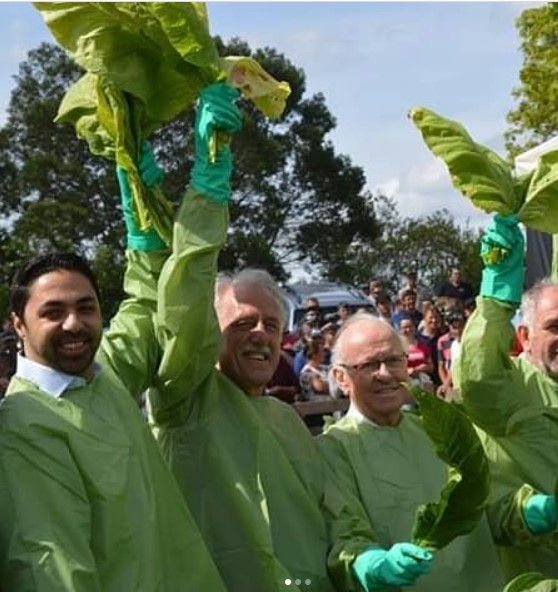
The footage is the official recording of a regular session at the Tobacco Sector Chamber, a collegiate that was not affected by the presidential decree and is part of the council which advises, in addition to other chambers, the Ministry of Agriculture, Cattle-raising and Supply on issues related to Agricultural Policies and the Brazilian Plano Safra. It is formed by representatives from the government and the productive sector and may be understood as an insult to the Framework Convention, ratified by Brazil 17 years ago in article 5.3, about the protection of commercial interests guaranteed by the tobacco industry.
Despite many victories achieved by Brazil, without Conicq, the National Policy is dismantled and weakened, preventing the reduction of deaths and diseases caused by tobacco and protection for farmers, who have been discarded from the production chain. In response to the Sector Chamber meeting episode, around 80 organizations signed a memorandum of repudiation, presented to the authorities.
Along the same lines, the extinction of Consea, the Food and Nutrition Security Council, and the dismantling of LOSAN, the Organic Food and Nutrition Security Law, have halted victories achieved over decades, such as the implementation of the National Food and Nutritional Security System. Composed as an advisory agency close to the President of the Republic and with a 66% participation from civil society, Consea played an essential role in enabling the dialog between government agencies and civil society, which allowed for the formulation and improvement of policies and programs which went beyond consumption, for they included actions geared towards food production, supply and trade.
Among the achievements by this collegiate realm, we can highlight the creation of the Program for the Purchase of Food from Family Agriculture and changes to the National School Meals Program, changing the minimum purchase level to 30% of foods to be provided by family agriculture.
In 2019, organized civil society took action in an attempt to avoid such a regressive movement, following the example given by the national super-banquet (“banquetaço”) where over 30 thousand meals were offered, and demonstrations of the role of the Council and the consequence of its extinction, as well as requesting signatures for an international petition. Memoranda of repudiation were issued by various entities and social movements, such as the Alliance for Adequate and Healthy Food, the Brazilian Public Health Association (ABRASCO) and civil society representatives in Consea.

Maintenance of the Council moved back and forth. A Special Mixed Committee was created in May 2019, followed by the suspension of the temporary measure and the recreation of the Council, subsequently vetoed by Bolsonaro. In September 2019, the Council was permanently terminated, with 299 National Congress parliamentarians voting for the president’s veto to be maintained and 162 against.
The undermining of the agency at the federal level gave rise to fragilities in collective participation state and municipal collegiate bodies, who maintained their activities. As examples we have the application and appointment of the Brazilian Association of Food Industries (Abia) and the Brazilian Rural Society (SRB) in May 2021, by governor João Dória, to the positions of presidency and vice-presidency of the São Paulo Food and Nutrition Security Council (Consea-SP). We touched on this case in another edition of MonitorACT, in the article named “Why the fox should not be left in charge of the henhouse”.
Also, in February of this year, the National Council of Municipal Health Authorities was also the target of a conflict of interests by establishing a partnership with Coca-Cola Brazil for assistance with the procurement of 400 refrigerators for the storage of vaccines in municipalities with a low HDI. The Alliance for Adequate and Healthy Food defined the action, in a memorandum of repudiation, as social washing, by attempting to promote and try to clean up the image of a company that manufactures products that increase the risk of Chronic Non-Communicable Diseases, conditions which exacerbate the prognosis for Covid-19 patients.
The Daily Poison on our Plate
By Vitória Moraes
The response by civil society via social media, at the end of last year, repudiating Bill 6299/2002, the so-called Poison Package, led to its being strategically removed from the agenda in the House of Representatives, at that point in time, to return to be put up for the vote on the second week of activity of the legislative year, taking everybody by surprise. It was, unfortunately, approved by 301 votes in favor and 150 votes against. Without popular participation, the project is now heading for the Federal Senate to be debated.
The Poison Package is a set of draft bills that have been modified within the legislative realm for 20 years, focusing on the relaxation of registration for agrochemicals. It makes the food insecurity context in the country even worse, as previously pointed out in a note by the Alliance for Adequate and Healthy Eating. The reduction of red tape assumed will consequently clear the way for inputs whose effects are known to be harmful to health, comprising substances with teratogenic, mutagenic and carcinogenic potential. Additionally, the term agrochemicals [“agrotóxicos”, in Portuguese] falls by the wayside, being replaced by “pesticide”, less transparent to the consumer.
According to the 6th Report by the Intergovernmental Panel on Climate Change, held in 2022 by the UN Environment Program and the World Meteorological Organization, the simplification of sceneries and the threat to biodiversity, both results of the modern agro-industrial model based on monoculture plantations on large patches of land with intensive use of agrochemical inputs, bring up concerns in relation to the future of the planet, since the unrestricted use of contaminants causes the death of plants and animals, whose result is a scenario of ecological imbalance, as well as the contamination of rivers and soils, which directly impact people’s health.
As an example, communities in the state of Maranhão reported, in February, the dumping of contaminants into the rivers of Mirador State Park, which resulted in damage to around 250 families who live in the region, most of them small farmers. Some inhabitants reported the appearance of wounds and skin burns, as well as headaches and diarrhea. These are just a few of the harmful effects of these substances on health, since a range of studies indicate an existing relation between exposure to agrochemicals and the onset of neurological disorders, some types of cancer and even psychological problems.
But for those who think that the issue affects only rural populations, think again. Although on a smaller scale, the problem also affects urban areas. A study carried out in a small community in Bahia shows that the arrival on the scene of a tobacco company, with a high activity of agrochemical application to the plantations, was the main reason for a significant increase in rural exodus rates in the region, which means less labor availability and a rural brain drain. In a country filled with large cities crossed by social inequality, squalor and violence, would these urban centers have the capacity to absorb these new inhabitants with dignity?
Despite more than 50% of Brazilian producers being formed by non-white people (Agro Census 2017/IBGE), those calling the shots vis a vis agriculture are a group of white males, who have a relationship with multinationals, not only in the agrochemical business, but also in the tobacco, ultra-processed foods and fuels industries, and even agents from the financial markets, as highlighted by the 2020 Statement Against Agrochemicals and for Life.

The Agribusiness Parliamentary Front (FPA), the main interested party in the ‘Safest Food Law’, as the Poison Draft Bill has been named by portals funded by agribusiness, is sponsored by companies such as Bayer, Basf, BRF, JBS, Bunge, Syngenta and Cargill. The Project rapporteur himself has ties to Japanese agrochemical companies, representing a major example of a conflict of interest, which jeopardizes the health of thousands of Brazilians.
Agrochemical manufacturers have been receiving tax incentives for decades, while policies to guarantee food and nutritional security and social welfare have been systematically scrapped due to budgetary shortfalls since 2016. In a country which has made the act of “opening the gates to release the stampede” [“passar a boiada”] a normal everyday occurrence, it is scary to think of what else could be given the green light from now on. The issue goes beyond debating whether to consume organics or not, since agrochemicals are being found even in ultra-processed foods.
The issue is systemic. We are in the face of a political decision that may cause irreparable damage to the environment, as well as overburdening an already weakened National Health System (SUS), not only with cases of poisoning, but also by people with chronic diseases. We are about to face a migratory wave inside the country itself, causing a further swell in the demographic bubble in cities, a problem which is strictly related to squalor and hunger. This issue exposes an extremely serious violation of the Human Right to Adequate Food, mainly the problem of seeing food as merchandise and not as a right.
Poison-free food should not be seen as a whim, a fetish, restricted to the few who can still make choices, but as a right and it is the way forward to build a fairer, more sustainable and healthier society.
8M: The Advances Made by the Alcohol and Tobacco Industries During Women’s Month
Mariana Pinho, Laura Cury, Alexandre Carvalho and Emily Azarias
The quest for gender equality, led by women’s movements, have historically opened doors to profound social transformation, as told by the origin of International Women’s Day itself. Celebrated on March 8, the date takes us back to marches in New York in 1909 and 1911, for better work conditions, the right to vote and better wages, as well as the Russian female workers’ marches.
Since then, there have been many achievements, although there is still a far way to go in practice. Gender equality has become a global cause. Also for companies. On the occasion of the 8th of March, it is common for there to be supposed social responsibility actions aimed at female empowerment and gender equality. Whatever it takes, as in the case of companies manufacturing products harmful to health such as tobacco and alcohol, who have long been aware of the importance of women (and girls) in the global market for their products and as a source of new customers. Thus, they run surveys in order to better understand how to direct their products and increase profits.

Tobacco companies, for example, have been investing in specific marketing strategies, launching brands with designs and messages aimed at the female audience and acting strongly within real and virtual environments where women are present. In the last year alone, for example, BAT spent one billion Pounds Sterling to promote their products on TikTok, where 60% of users are female…
They are also on the radar in rural regions. Tobacco is a traditional and patriarchal culture, but in order to maintain the business, male domination in the sector is being surpassed. In 2017, 10% of BAT Brazil contracts were signed by women. Companies have invested heavily in training and capacity-building through a partnership with the National Service for Rural Apprenticeship (Serviço Nacional de Aprendizagem Rural - Senar) to implement programs such as “Excuse me, l’m going for it” (“Com licença eu vou à luta") and “Woman of Today” (“Mulher Atual”). To increase female access to contracts, awards are granted at the National Congress for Women in Agribusiness. These strategies were also pointed out in past editions of MonitorACT, in the articles “The feminist movement captured by companies ( “O movimento feminista capturado pelas empresas”) and “The worthless reward” (“O prêmio que não compensa”).

An analysis carried out by National Cancer Institute researcher André Szklo warns that the number of women who have stopped smoking in Brazil is lower than that projected by the World Health Organization. For the age group between 18 and 24, women (19.8%) lead men (8.9%) by a long shot when it comes to starting to use smoke-emitting tobacco products.
And this doesn’t only happen with regard to tobacco. The increase in beverage adverts directed at women and changes in gender roles have also led to an increase in alcohol consumption among women. When adding up the profits, equality achievement takes second place, which is nothing new to tobacco companies. All it takes is to look at older advertisements, made before tobacco regulation was disseminated in various countries.
So much so that in 2019 Scottish organization Alcohol Focus Scotland raised the #DontPinkMyDrink campaign, criticizing alcohol industry strategies, which after years depicting women in advertisements as objects and sexualizing them, started to associate their products with friendship, feminism and female empowerment.
Consequently, between 2006 and 2019 there was an increase in alcoholic beverage consumption and more specifically, a 70.5% increase in alcohol abuse among women (Vigitel, 2020). The2019 National Survey of School Health (Pesquisa Nacional de Saúde do Escolar - PeNSE) also presented a higher increase of experimentation among girls (36.8%), versus 32.3% among boys.


With regard to alcohol consumption, it should be noted that women tend to be more vulnerable to its effects due to differences in biological composition. Alcohol intake also increases the risk of developing breast cancer, even at a daily consumption level of only one dose of alcohol. Any amount of alcoholic beverage during pregnancy carries a risk both to the mother and to the baby, who may develop Fetal Alcohol Syndrome (FAS), causing damages to cognitive and behavior development in children.
Social factors also affect women disproportionately due to double and triple work shifts usually imposed. The Covid-19 pandemic exacerbated this, with tobacco and alcohol industries taking advantage of the stress and anxiety context: during the first months of the pandemic, an increase of around 10 cigarettes per day was more common among women (29%) than men (17%), among those who continued to smoke (Convid/Fiocruz).
Gender perspective in public policies is imperative for us to achieve a sustainable future. This construction is about formulating and effectively implementing evidence-based public policies in order to reduce consumption of unhealthy products and promote health and human rights, reducing interference by the alcohol and tobacco industry in public health. Particularly when it comes to the regulation of publicity, advertising and marketing – including actions of corporate social responsibility and by companies who try to present themselves as “part of the solution”.
Technical Information
Revision and editing: Anna Monteiro
Art: Ronieri Gomes
Monitoring Team
Anna Monteiro
Bruna Hassan
Camila Maranha
Denise Simões
Emily Azarias
Fabiana Fregona
Laura Cury
Mariana Pinho
Marília Albiero
Victoria Rabetim
Vitória Moraes




